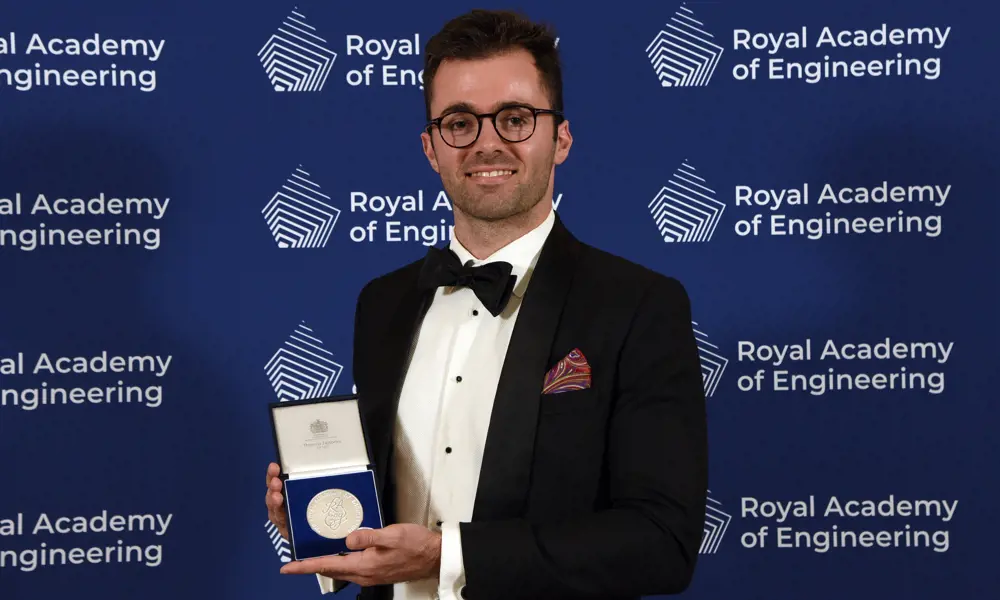
Q&A: Dr Harrison Steel
Why did you become interested in science and engineering?
I’m not sure there’s a specific event I can point to, though two memories from earlier years come to mind. One is from when I was in kindergarten. My kindergarten kindly provided the kids with broken electronic devices, like old printers, as well as (blunt) hand drills and hammers. The exciting activity was then to smash up the printers and find out what was inside, sometimes collecting the shiniest components to take home… what a thrill for a 4-year-old! Perhaps this wouldn’t be allowed now for safety reasons, in which case, kids are really missing out...
The other memory is playing videogames as a teenager, which often involved optimising or creating a character to win in some battle or another. This may sound nothing like engineering, but I think the general idea of (patiently) considering all the facets of a problem and then combining the tools at your disposal to come up with a solution has a lot of carry over!
How did you get to where you are now?
I “formally” started in engineering after high school. I moved to Sydney (Australia) to study as an undergraduate because they offered a degree that I liked the look of, as it included some space-related courses. As it turns out, I haven’t since worked in anything related to space, but the course was fantastic and attracted a lot of other excited people. In practice, being around excited and ambitious people was much more important than the engineering speciality.
In practice, being around excited and ambitious people was much more important than the engineering speciality.
Dr Harrison Steel
Anyway, after that I worked for a while, and was then fortunate enough to get one of the General Sir John Monash Scholarships (an Australian foundation) to go overseas to do a PhD. This led me to Oxford, which I aimed for on the basis that there were people doing excellent research, and I would also have the opportunity to do plenty music (choir!) and sports (athletics!) during my time there. I’ve been there since, as a PhD student, post-doc, and now academic.
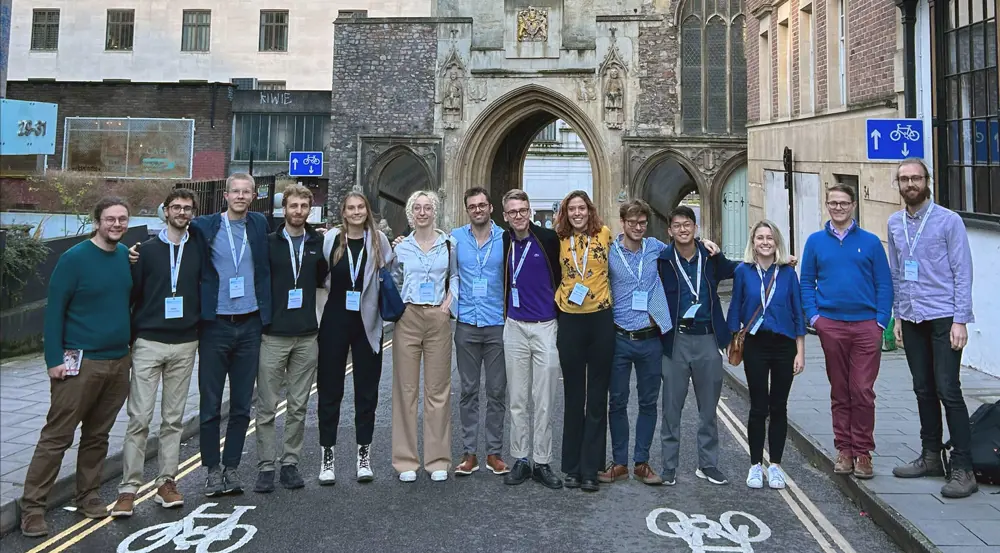
Harrison and his team by the engineering department at the University of Oxford © Department of Engineering Science, University of Oxford
What has been your biggest achievement to date?
One thing I’ve been very proud of over the last several years is building a research team that brings together people from many different backgrounds – both personal backgrounds, as well as their areas of study and expertise. We have people from engineering, biology, math, computer science, and several other fields working together to create new technologies which (we hope) will go on to help with some of the big challenges in healthcare and climate change. I’m looking forward to all the things we’ll achieve together in the future!
What is your favourite thing about being an engineer?
On the flip side of the last question, I do really like the technical work. Whether this is putting something together in the lab, designing a circuit, or writing code, I can happily do that for hours. In many ways, these things come back to that video game experience I mentioned – you have some goal and your challenge is to combine different approaches that previous engineers have developed (and make new ones where they are missing) to come up with a solution!
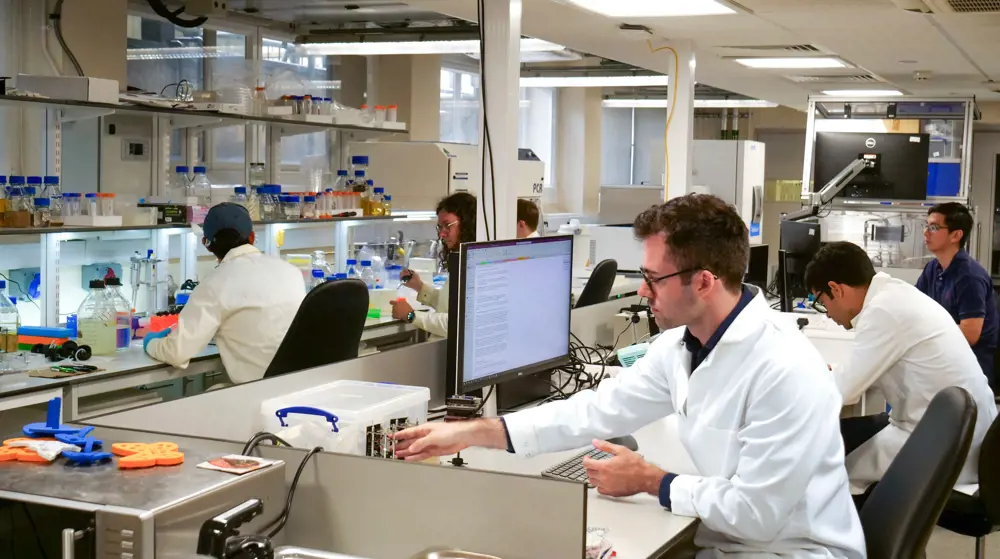
Harrison in the lab with some of the research team © Harrison Steele
What does a typical day involve for you?
Since 2020 I’ve been an associate professor which – in short – means I spend my day doing a complete mixture of random tasks. This can range from working in a laboratory building things, to applying for grants and administration, to leading a team of other engineers and helping them build their own careers. This might sound a little strange, since you would imagine an engineer would spend most of their time doing “technical” engineering, but in practice, a huge amount of it is organisational and people skills.
This is tricky in many ways, not least because you spend most of your training doing technical work and then need to transition to a more leadership-oriented role. But, it does mean you get to learn about a huge variety of different topics, and (at least in the academic setting) have a fair amount of choice over what problem/s you pick to work on.
Quick-fire facts
✨ Harrison's book and YouTube inspo
Age:
31
Qualifications:
Undergraduate degree in Mechanical Engineering and Science. PhD in Engineering Science.
Biggest engineering inspiration:
Difficult to say. Maybe Vannevar Bush (I recently read his book Pieces of the Action), or the biographer Robert Caro (not an engineer, but someone with admirable patience and attention-to-detail!). If I have to pick something more recent, I’d go with the YouTuber “My Mechanics” for their meditation-like restorations of old tools!
Most-used technology:
Disappointingly, probably my phone or laptop.
Three words that describe you:
Curious, Crafty, Persistent
What would be your advice to young people looking to pursue a career in engineering?
First would be to not wait for permission or the perfect timing to do things you are interested in. Often this is referred to “agency” – the ability and willpower to have an idea and then follow it through. So, if you want to make an app, go find a basic tutorial for the simplest possible approach, and start trying to code it! Or if you want to make some physical thing but don’t have the parts or tools you need, go find the email (or LinkedIn) of someone that might and send them a message saying you are an interested young person and ask if they would help you. Pestering people (politely) on the internet is a great way to get things done in the modern world.
Pestering people (politely) on the internet is a great way to get things done in the modern world. Building on this idea, my second piece of advice would be to get comfortable with not knowing what you are doing
Dr Harrison Steel
Building on this idea, my second piece of advice would be to get comfortable with not knowing what you are doing. I am constantly searching questions on Google, or talking with an AI Assistant, often asking very simple questions that I probably learned the answer to in high school but subsequently forgot. Anyone who is working on anything particularly ambitious will have to constant operate in this zone of continual ignorance (and learning). Alongside perseverance this is the only “secret tool” you need to make that app or engineering idea mentioned above!
What’s next for you?
A book and a cup of tea, I have probably talked too much already!
Keep up-to-date with Ingenia for free
SubscribeRelated content
Health & medical

A gamechanger in retinal scanning
2006 MacRobert Award winner Optos rapidly became a leading medical technology company and its scanners have taken millions of retinal images worldwide. There is even a display at the Science Museum featuring the Optos development. Alastair Atkinson, of the award-winning team, describes the personal tragedy that was the trigger for the creation of Optos.
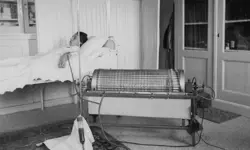
Kidney dialysis
Small haemodialysis machines have been developed that will allow more people to treat themselves at home. The SC+ system that has been developed is lighter, smaller and easier to use than existing machines.
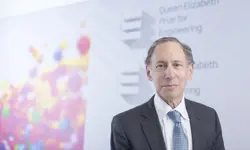
Engineering polymath wins major award
The 2015 Queen Elizabeth Prize for Engineering has been awarded to the ground-breaking chemical engineer Dr Robert Langer FREng for his revolutionary advances and leadership in engineering at the interface between chemistry and medicine.
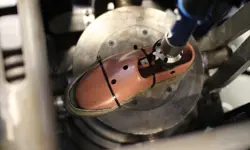
Blast mitigation and injury treatment
The Royal British Legion Centre for Blast Injury Studies is a world-renowned research facility based at Imperial College London. Its director, Professor Anthony Bull FREng, explains how a multidisciplinary team is helping protect, treat and rehabilitate people who are exposed to explosive forces.
Other content from Ingenia
Quick read

- Environment & sustainability
- Opinion
A young engineer’s perspective on the good, the bad and the ugly of COP27

- Environment & sustainability
- Issue 95
How do we pay for net zero technologies?
Quick read

- Transport
- Mechanical
- How I got here
Electrifying trains and STEMAZING outreach

- Civil & structural
- Environment & sustainability
- Issue 95